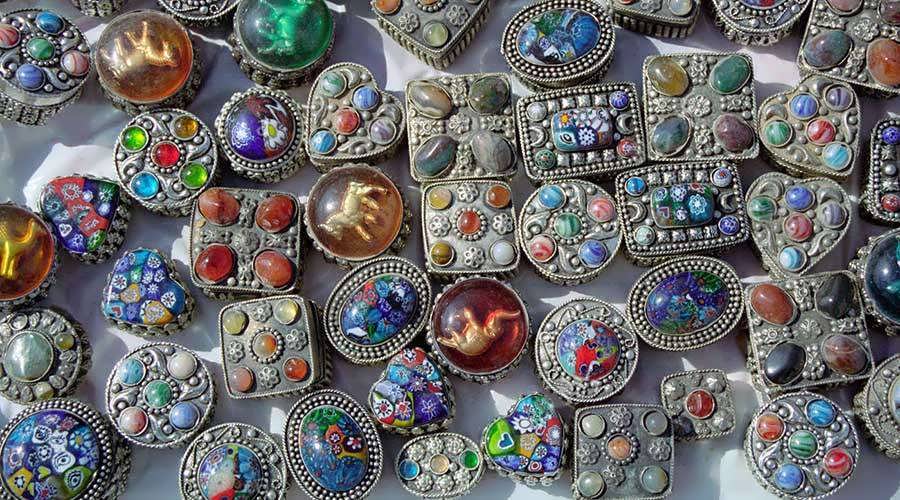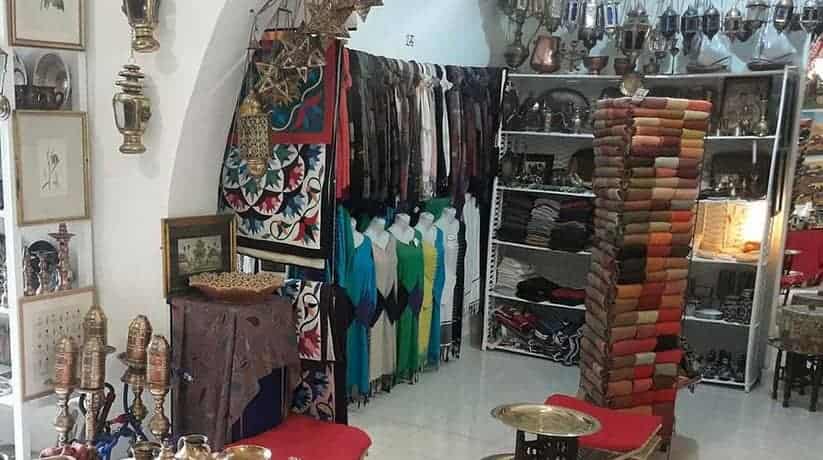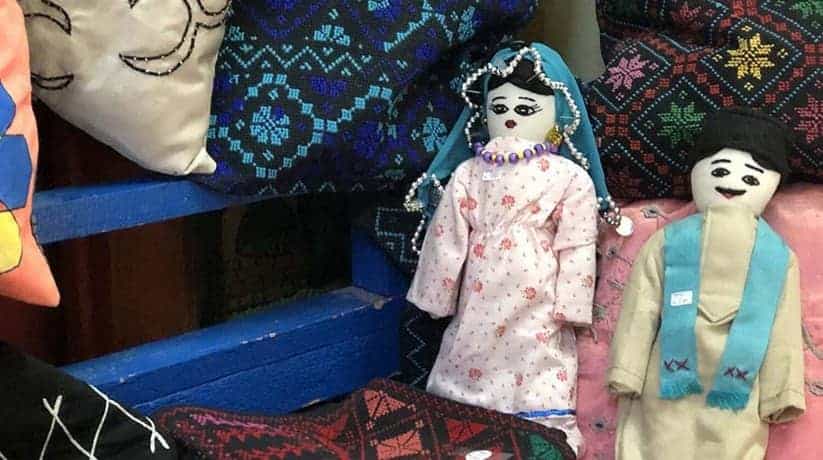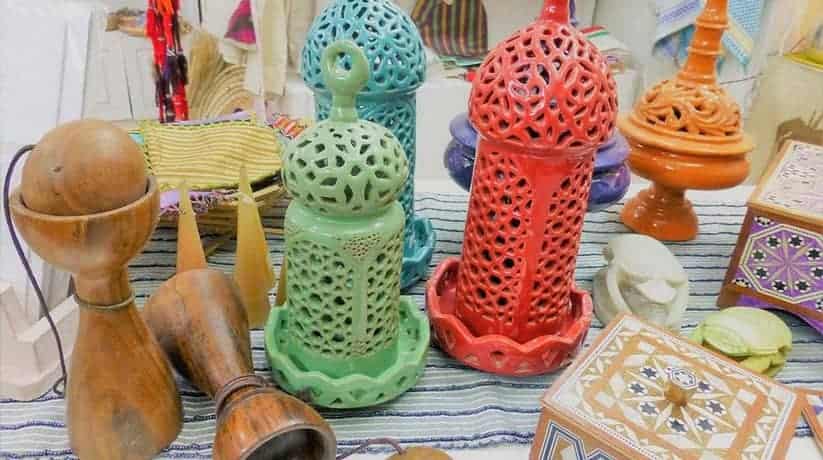Fair Trade Center Luxor Egypt tours, prices, booking, reviews
Fair Trade Center Luxor located near the Emilio Hotel on Karnak Street. In fact, from the outside, Fair Trade Center Luxor looks as if it is just another gift and souvenir shop. However, when one enters the shop it becomes clear that it is quite different. That is because the center is not an ordinary shop. Every product is a story of a poor family earning money from selling their products. They sell their products Fair Trade Center Luxor and similar organizations. The organization collects their products from a lot of places around Egypt. The girls working in the Fair Trade Center well educated. Moreover, they have the skills and the language to deal with tourists. They deal with them in a friendly and professional manner.
Fair Trade Center Luxor indeed a non profit project aimed. It aims to support people among the poorest of the population. In fact, it does by marketing their handicraft products and guarantees them a fair price. The project is a social project of a local company. It run by young women from Luxor. The center offers high quality products at fair prices. It also offers information about the producers. The Village of Naqada lies on the West Bank of the Nile close to Qena. It was a center for weaving for many centuries. The “Ferka”, a long-length scarf, woven in fine designs and colors. It is the main specialty of the Naqada weavers. In the past it worn by Sudanese women on three major occasions. The three major occasions are marriage, child birth, and male circumcision.
Further details about Fair Trade Center Luxor:
“Ferka” woven with a cotton and silk blend of yarn. In the last fifty years, artificial fibers introduced into the blend. It was to increase the brightness of the fabric. In fact, the weaving work still done at home. It uses simple hand-looms of a type that have been in use since Pharaonic times. The cessation of the trade with Sudan, the ups and downs of tourism left many weavers without jobs. Most of them are illiterate and landless. Church workers in the area help them to ease their situation by bringing their products to Cairo. Nowadays, the women of Naqada weave other products also. In fact, they weave scarves from the best cotton, based on the old designs.
Fair Trade Center Luxor helps these working women in marketing their products. Moreover, it also increases their profits by selling their products to tourists in the store. The scarves they produce are a mixture of cotton, silk and fabrics with colorful designs. Furthermore, they suit women and some of them suit men as well. There are many designs and sizes of the scarves and every item is a piece of art. Their prices range from about 45 to 80 Egyptian pounds. It is according to the size and the material, which produced to be easy on the skin.
Fansina Bedouin Crafts at Fair Trade Center Luxor:
In fact, Fansina means Sinai arts. It is a Bedouin owned business. In fact, it produces and markets Bedouin crafts. Moreover, it established as an income generating initiative for the local craftspeople in the South Sinai. It seeks to promote and sustain the Sinai Bedouin culture’s heritage. Moreover, it operates on principles of fair trade. To emphasize the beauty of their products, Fansina chosen Mona Lisa symbol attired with Bedouin crafts products. Fansina operates the Bedouin house in St. Catherine in the South Sinai. It is where they offer their products for sale. The project is by the Egyptian Environmental Affairs Agency and The European Union.
Fair Trade Center Luxor sells many items of the Fansina products. They sell colorful handmade small bags that cost from 30 to 40 Egyptian pounds. Moreover, they also sell the famous dancing scarves which belly dancer puts around her waist while dancing. There are many different colors of these. They cost about 35 Egyptian pounds per each. Furthermore, there are also the “Mandeel” the piece of cloth the Bedouin women use to hide their faces. This item costs 62 pounds because of the many ornaments. All the Fansina products are indeed great and make wonderful gifts. The most interesting item is the huge piece of cloth that Bedouins use to put on their camel. It is to make it easy for passengers to ride. This piece of art takes weeks to finish and it costs 480 Egyptian pounds. It is indeed a real masterpiece.
Community Development Association of Abu Tawila at Fair Trade Center Luxor:
In fact, this community founded in 1967 in Abu Tawila, near Arish in the North of the Sinai. It was with the aim of promoting the social development of the local community. However, due to the Israeli invasion of Sinai in 1967, the activities halted. In 1982, the association established again. Since that year, it promotes socio – economic development through encouraging small production projects. One of the most important activities of the Association is the production of Bedouin carpets. This income – generating activity involves approximately 70 women. It allows the preservation of traditional handicraft techniques. These techniques were in danger of dying out. Fair Trade Center sells Bedouin carpets with different colors and designs. Bedouin carpets produced in North Sinai and all are handmade. Some of them cost about 200 pounds while others are more than 1,000 Egyptian pounds. It is according to their sizes.
Fayoum Pottery School at Fair Trade Center Luxor:
The children in the villages of the Fayoum create their own toys, forming them from the clay of the canals. Two Swiss potters chose Fayoum for their new workshop. They developed their own pottery using local materials. Their work attracted the children of the neighborhood who came to watch. Soon they started making their own creations. At the initiative of the authorities a vocational school built. It is where the children can learn various pottery techniques. It is while developing their own innate artistic sense. Their products are unique and varied. The objects created by the children shouldn’t be a source of income for them. Otherwise, they would soon lose their creativity and do only what sells. A small financial contribution from the sales distributed to the children who attend the school regularly.
This motivates them and helps their families let them attend the school. The school uses a simple technology, especially for the kilns. Thus, after their apprenticeship, the students can start their own production. It is with little initial investment. Fair Trade Center sells many of their pottery products. Most of them are simple pottery designs. They are white with simple red or blue drawings. A mug or a cup of tea is great from the Fayoum pottery. The items cost from 35 to 100 pounds.
Further details about Fair Trade Center Luxor:
In a poor area in the East of Cairo, a few unemployed Christians founded a family workshop. It is to help people support their families. They produce simple jewelry from brass and metal. These pieces engraved with traditional Islamic and Christian designs. They also produce beautiful leather bags and decorative objects. The bags are really fine products. This is because they are practical, classy, and cheap. The bags cost from 85 to 160 pounds according to size. The woodcarving project in the village of Hegaza, 30 km from Luxor, begun in 1986. A special workshop established to train young men, ages 16 to 19. Through an intensive program lasting three years.
After training, each of the young men is responsible to train another group. The group is of 35 young men in the art of woodcarving. This workshop issued from the imitative of a young freshman. They are who taught the first group in the production of small wood-carved objects. The products designs inspired from nature including animals and plants. Combining modernity and tradition, the artisans draw inspiration. It is from ancient Egyptian drawings and objects such as can seen in various museums all over the world. They sell wooden carved toys and some other spoons and small wooden plates in the Fair Trade Center. They cost from 20 to 60 pounds.
Refugees Workshops at Fair Trade Center Luxor:
A lot of refugees from war-torn African countries live in Egypt. Egypt allows them to stay in the country but doesn’t allow them neither to work nor to go to school. UNHCR and a group of NGOs support them with their elementary needs. Some of the women find household work. Most men don’t have any means of supporting their families. Several social organizations started workshops. It was to help them learn a craft and earn a small income. The first such workshop, TUKUL Crafts, created by a group of churches in Cairo. They produce products with traditional African motifs.
Fair Trade Center Luxor supported the creation of another small workshop. It is where refugees trained in traditional crafts of creating “mother of pearl” decoration. The first products of this recently created workshop are coasters with Islamic designs. These coasters can also distributed as an inexpensive present for companies and organizations. Special designs can created on demand. Other products are in the planning stage. They also sell beautiful bags with Sudan designs. A bag cost about 62 pounds.
The pottery of Garagos at Fair Trade Center Luxor:
Garagos is a small village 25 km north of Luxor. Much of the population of Garagos make their living by creating pottery. On the initiative of two French monks, the architect Hassan Fathi designed the pottery which first made in 1955. The nephew of one of the monks and owner of a pottery company in France, came to Garagos. It was to teach the young men the new craft. They also came to support them until they were able to function without help. Most of the products sold at annual exhibitions in Cairo and Alexandria. A lot of tourists once came to Garagos to admire the work and buy the products. But after some recent events, the increased security measures do not allow this anymore.
The objects produced with the same red silt that the pharaohs used 5,000 years ago for their pottery. The work from Garagos characterized by the brown, blue and gray glazing. It is with slight yellow and green tones. The designs are fish, birds and the Coptic cross. I saw a whole set designed for tea and hot drinks from Garagos. It can suit a newly married couple or anyone at home. It costs about 220 pounds for the whole set.
Association of the Protection of the Environment at Fair Trade Center Luxor:
The Association of the Protection of the Environment established in 1984. The purpose was to improve the livelihood of Cairo’s garbage collectors. It is by engaging them in recycling of solid urban household waste. Moreover, it builds upon the technical expertise of the formal and informal sector garbage collectors. It is while improving their professional, educational and health standards. The association set up a paper-recycling unit. This income-generating project helps girls and young women. It helped them to gain relative financial independence and assert themselves with their families. Over 60 girls and women involved in this project.
The whole recycling paper process takes place in a special workshop at the premises of the association. The products recycled from second-hand paper that the association gets from different sources. The paper then used for notebooks, cards, and art paper. The lesser quality paper printed and used for a wide range of small accessories. The association offers a variety of social services to producers. It includes education, as well as personal and environmental hygiene. There is a big selection of cards which produced from recycled paper in the Fair Trade Center. It is with simple drawing on them. They cost from 10 to 20 Egyptian pounds per card
Thursday Bedouin Market.
More details about Fair Trade Center Luxor:
These creations come from the Bedouin market that takes place each every Thursday morning. It is in El Arish on the Mediterranean coast of the Sinai Peninsula. Bedouin women from all over and across the Sinai make the journey to the market. The income these women earn each Thursday is essential to their family’s well being. These Bedouins pieces are from the Central part of the Sinai, an area that is difficult to reach. Due to their inaccessible geographic locations, the women who make these items not organized into a producers group. In fact, they not like most of the other craftspeople represented at the Fair Trade Center in Luxor.
Decoration is vital for the appearance of a Bedouin woman. She does not consider herself dressed unless she wears a variety of accessories. It is in addition to the Borqo’ (face covering which leaves the eyes showing). These include several of the items which maybe worn about the head, the face, shoulders or waist. Often, the Bedouin women will wear such accessories under her garment. It is to give an illusion of greater body size. It is indeed an important element of beauty for the Bedouins. The Fair Trade Center sells two main items from the Bedouin market. They sell the borqo’ for 62 pounds. The piece of colored cloth the Bedouin woman puts around her waist is for 35 pounds. These are some of the items that seem to be especially of interest to tourists.
Women Income Generation and Training Association:
The program started in 1990. The aim was to help the Bedouin women to earn a more regular income. Moreover, to have more direct control over their own lives. It is through awareness building, poverty alleviation and mobilization. Preservation of the cultural heritage of the North Sinai is another aim of this initiative. Today approximately 250 women take part in this program. They have also access to literacy classes and health education. Fair Trade Center Luxor sells many gallabeya, the traditional Egyptian woman dress. They have some white and others colorful with many handmade designs. The prices of these items range from 250 to 600 pounds according to how much handmade designs the dress has. The white dress is the cheapest.
The weavers of Akmim at Fair Trade Center Luxor:
In fact, Akhmim is a Coptic town in Upper Egypt which was a center for textiles since Pharaonic times. As a result of the modernization of the textile industry, the demand for manual weaving slowed down dramatically. For the landless families of Akhmim, this meant unemployment and poverty. In 1988, the Orthodox Youth Association started a program. The program was to maintain the tradition of hand weaving in Akhmim. Moreover, it also was to assist some of the poorest families in the area. They began with three looms and a limited supply of raw material. There are now more than 20 weavers and their families working for the association.
The weavers work in family units. It takes two people to operate the loom and several others in the preparation stage. In fact, most of the workers are men and the women who assist in finishing of the products. Most products reproduce design and motifs inspired by the Coptic tradition and motifs. Fair Trade Center Luxor sells many items from Akhmim. The items like bedspreads of different sizes and designs. Some of them are 160 X 240 cm, which sell for about 104 Egyptian pounds. Another size is 270 X 270 cm for 216 pounds. Some of the bedspreads sold by the meter, at about 70 pounds per meter.
More details about Fair Trade Center Luxor:
In fact, Fair Trade center Luxor sells other products they get from Luxor as well. They sell attractive looking soaps with animal designs that are suitable for kids. The animal soap costs 16 pounds. Moreover, they also sell a set of three soaps for 44 Egyptian pounds. Furthermore, they also sell pretty bottles in a variety of designs. They used as gifts or souvenirs. They cost from 10 to 15 pounds. Fair Trade Center Luxor also sells other items such as the silver accessories. In fact, the center sells rings, earrings and bracelets. A small silver earring can make a fine gift and costs between 25 and 60 pounds. It is according to design and weight.
Fair Trade Center Luxor also sells huge silver accessories that cost from 600 to 2000 pounds. No woman can wear this huge piece. They rather use it for decorations at home. Fair Trade Center is like a shopping museum. It is a museum for handcrafts because many of the products maybe died out. In fact, it is a must see shopping spot for tourists in Egypt. It also gives the tourists a chance to help poor people all around Egypt by buying their products. Fair Trade Center has another shop called “Naturally Egypt”. It is on Radwa Sherifa St., close to the Sonesta Hotel in Luxor.

















